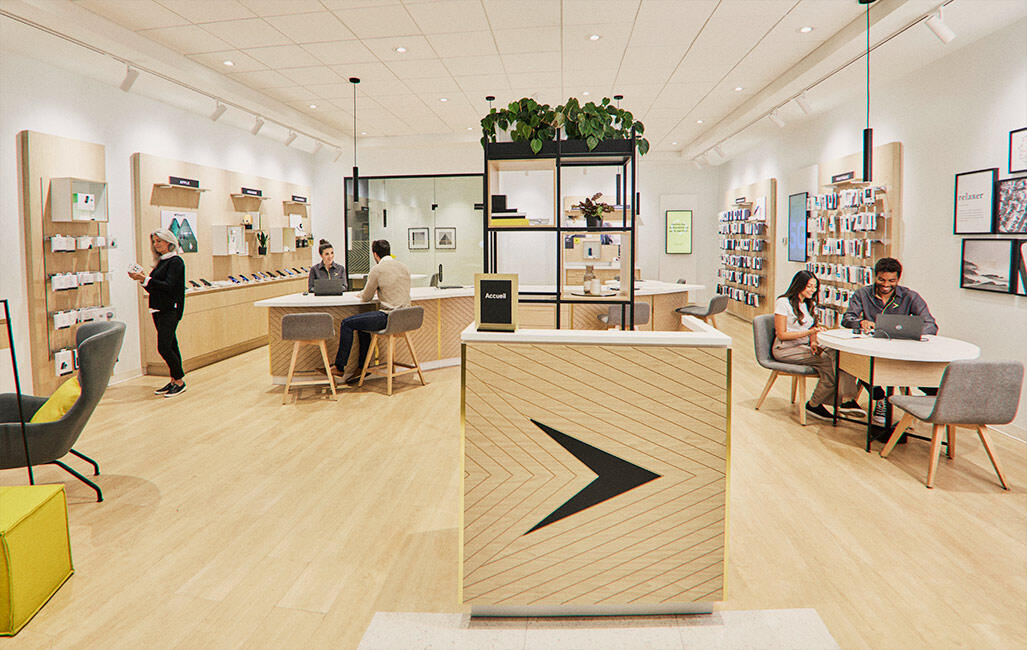
Deciding to roll out an Internet of Things project is one thing. Doing it well is another. Asking the right questions before you begin allows you to start things off on the right foot.
Good to know
The Internet of Things Business Solutions | Videotron Business) IoT) is now a well-established fact in business. No less than 90% of decision-makers surveyed worldwide for Microsoft’s IoT Signals 2021 study stated they had at least one active IoT project underway. In all, 66% of decision-makers planned to even increase their use of the Internet of Things within two years.
Whether you’re establishing your project internally or with a partner, asking yourself the right questions before you start making decisions will provide you with every chance of pulling off a successful project that responds not only to your current needs, but to future needs you haven’t even begun to think about.
What are my expectations and needs?
There are many reasons to jump right in to the Internet of Things. But targeting those that apply to your particular situation will help you choose the right technology.
According to IoT Signals, in 2021, quality assurance was the main factor driving IoT adoption, but it wasn’t the only one. Operation optimization, employee productivity improvement, security (of data, devices, and employees), predictive maintenance, supply chain management, increasing sales, reducing energy consumption, materials tracking, innovation research, and many other reasons have been pushing businesses to start such projects.
To give any project the most chance of achieving success, make sure you’re not throwing a message in a bottle into the ocean, hoping it will somehow connect up with the rest of what your company is doing. “You need to understand what your business needs are and see how the project could be integrated into your overall strategic plan,” explains Bruno Crispin, Project and Strategy Director of Business Mobility Solutions and IoT at Videotron Business.
Who will benefit from these solutions?
Another question to ask yourself is who will benefit from your IoT project: the company, your employees, or your customers (consumers, citizens, or others, depending on your sector of activity)? “Often, several of these answers might apply,” states Crispin. A delivery company that sets up a tracking system for its fleet, for example, can alert a customer when their package is about to arrive, can alert employees at the warehouse when an empty vehicle is returning, or can make the work of delivery drivers easier while they’re on the road. It’s win-win for everyone involved.
Good to know
The principle is also the same in the public sector. A municipality that puts in place a smart garbage collection solution, using RFID sensors in bins, can better manage its assets and potentially revise its collection routes and days for certain areas so that their schedule more closely corresponds to the needs of those particular areas. Over time, targeted messaging can also be aimed at certain streets where, for example, the composting rate is lower than it should be in order to encourage residents to participate in such programs more.
In this situation, optimizing operations doesn’t just allow you to reduce costs, but also improve customer experience and become an asset for both the community and the environment.
Knowing the intended consumer of a product particularly has an effect on the technologies you will adopt and the tools that will be required once the project is established. A professional geographic information system (GIS) is probably all that is needed to fulfill the needs of city employees, but a web application would be necessary if residents also need to consult any information collected by connected devices.
How will you manage your data?
IoT projects enable the collection of data such as river flooding, cold chain tracking, and temperature measurement in different hotel rooms. Each installed sensor collects information that can be consulted, processed, and analyzed.
The goal may simply be to track data over time (such as measuring the amount of sun in a field during summer) or for more complex purposes, such as receiving an alert when abnormal values are detected (such as when a refrigerator door has been left open), or even for automating a task (such as automatically ordering a product when inventory is very low).
“Different projects will need different platforms for visualizing such data,” notes Crispin. A public transportation company that wants to track its buses will need, for example, a graphical user interface (or GUI), while a factory would instead process such information using predefined algorithms.
A number of established IoT platforms on the market will provide such functionality. They vary widely and each has its particular strengths and features. “By planning correctly, you can find the right solutions that will enable you to later avoid the data fragmentation trap, which is when companies need four different platforms to manage their data,” adds the Director of Products and Strategies for Business Mobility Solutions and IoT at Videotron Business.
Can you add value to your data?
Installing a good IoT system allows you to not only automate certain operations that were formerly handled manually, but to also add value to the data you extract.
Montréal’s administrative portal, for example, already has a data collection, management, and processing system. With the help of the specialized artificial intelligence supercluster at Scale AI and Ivado Labs, the municipality was able to put in place an AI solution for reducing storage times for containers holding critical medical products, particularly related to the COVID-19 pandemic. Without the Internet of Things, such a system could never have been developed.
A shoe company with technology for precisely tracking its inventory could use this data to take advantage of an AI solution, such as the one offered by Canadian company FIND.AI. Their solution facilitates stock and supply chain planning and enables improved demand response that can respond to the specific needs of any particular industry. Here too, connected devices can be installed for one reason, but the data extracted can be applied towards other uses.
Such secondary uses don’t necessarily need to have been foreseen in advance, but the IoT project needs to be properly designed to facilitate such possible usages. Knowing what the potential downstream uses may be will help you choose the right platforms and technologies upstream.
How much are you prepared to invest?
Knowing your budget (for the pilot project and future expansion) enables you to target your research when it comes time to search for technology that will fulfill your needs.
The good news is that an IoT project doesn’t necessarily require major investments. “Our business model enables pay per use, so there’s no barrier to entry or nasty surprises when it comes time to scale up. You can start small, then grow when you’re ready,” explains Charles Coutu, Director of Mobility Product Development and the Internet of Things at Videotron Business.
Good to know
The time needed to realize a return on your investment will naturally vary from one project to another, but IoT solutions are often not very costly and offer big benefits, fast.
What is your long-term business plan?
What will your business look like in five years? Are you planning to grow, move, or explore new markets? And what about your IoT plans? What other projects would you like to consider?
Without being overly specific, projecting ahead a few years into the future can help determine the scope of your projects and the order in which they should be implemented. Your IoT partners can then better help to advise you on not just where you are at the moment, but where you’re headed.
A company with international targets, for example, could benefit from a next-generation connectivity platform that will enable it to install connected devices worldwide, even if the company is only operating in Québec at the moment.
How would you evaluate your IoT expertise?
IoT expertise varies greatly from one company to another. That said, 61% of companies have a high level of maturity when it comes to the Internet of Things, according to consulting firm Gartner.
“We have clients who have their own developers and a high level of understanding when it comes to IoT. They’re looking for a particular solution, often one that will integrate into their existing operations. On the other hand, others are hoping to gain a partner that will help them through their process,” explains Coutu.
But both ends of the scale aren’t necessarily mutually exclusive. You can have a good understanding of the Internet of Things and want to partner up with a technological provider. “Even when a company is well equipped, it needs to take care not to overload its IT team,” warns Crispin.
A small pilot project can be expanded over time. Being aware of your own strengths and limitations can influence the kinds of solutions you should adopt, but also encourage you to find the right partners, including a project leader who can guide the venture through to its final stages and then evolve it to respond to the company’s future needs.
No matter what your level of expertise or the complexity of your project, the experts at Videotron Business can help you set things up, with the help of reliable, established partners, many of which are based in Québec. They can also help you avoid the main pitfalls that are common amongst IoT projects.
January 11th 2022, By Videotron Business






